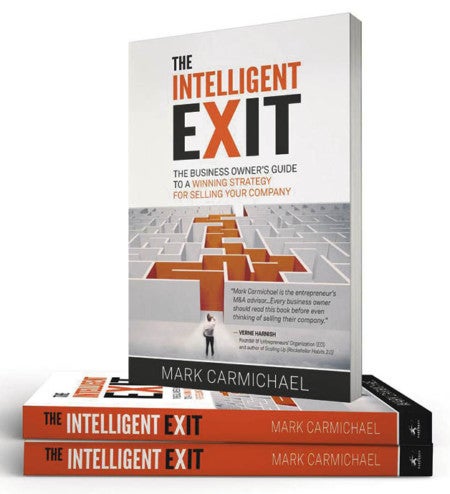 Mark Carmichael is a lifelong serial entrepreneur. He sold his first business 20 years ago and today, with half a lifetime of building and selling companies, including the last ten years as a mergers and acquisitions (M&A) deal-maker, he knows first-hand the challenges entrepreneurs face when selling their companies.
Mark Carmichael is a lifelong serial entrepreneur. He sold his first business 20 years ago and today, with half a lifetime of building and selling companies, including the last ten years as a mergers and acquisitions (M&A) deal-maker, he knows first-hand the challenges entrepreneurs face when selling their companies.
“I can’t imagine a scenario an entrepreneur can share with me that I can’t relate to on a personal level,” says Mr Carmichael. As a lifelong entrepreneur turned M&A adviser, his perspective is unique among his colleagues. “I’ve successfully built and sold companies, however not always without challenges and disappointments along the way. I’ve learnt a lifetime’s lessons,” he says.
Too many business owners sell without mastering any of these tips
One such lesson is the impact of developing and executing a clear and focused strategy when selling a business. “It’s frustrating and sad to hear the countless stories of entrepreneurs who fail to implement a determined strategy and accept a sub-par, or worse awful, deal,” he says.
Mr Carmichael’s recently published book, The Intelligent Exit: The Business Owner’s Guide To A Winning Strategy For Selling Your Company, is a compilation of the lessons learnt after decades of being on every side of an M&A transaction, as a buyer, seller and adviser. He has distilled this advice into some key concepts for entrepreneurs considering the sale of their business:
01 CREATE A COMPETITIVE BIDDING SCENARIO
The surest way to receive the highest price and best overall deal structure is through rival bidders vying for your company. Sellers often assume, wrongly, that an unsolicited offer is the only or best one out there. Expand the investor outreach process by identifying and engaging strategic and financial buyers alike, both domestic and abroad. An international strategy expands the universe of potential acquirers, increasing the probability of multiple bidders at the negotiation table. Foreign buyers may be interested in your customer base, intellectual property, geographic footprint; don’t presume to understand their interest in your company until you engage with them.
02 PLAN IN ADVANCE
A sale can take 12 or more months to complete, although six to nine months is average. Advance exit planning accelerates the process, enhances buyer confidence and preserves the value of your business. Doing your homework and having the right adviser guiding you is essential. Is your intellectual property protected? Are your licensing agreements satisfactory? Are your last three years of accounts audited? Can the business operate without your daily involvement? Any outstanding lawsuits to resolve? The exit checklist can be extensive and time consuming to deal with.
03 UNDERSTAND YOUR BUYER’S MOTIVATIONS
A financial buyer is interested in your firm’s ability to generate an acceptable return on investment. They’re interested in the cash flow produced by your business and the future exit opportunity. Therefore, highlighting your firm’s cash flows and future profits is key. A strategic buyer, by contrast, will be interested in how your company fits within their existing landscape. Do you offer new geographic reach, bring a valuable customer base, offer research and development, intellectual property or distribution channels? Strategic buyers pay for synergies. Knowing your buyer enables you to employ the right approach for each potential bidder.
04 MARKET YOUR BUSINESS
Your objective is to create a competitive bidding process involving qualified buyers. The job of creating that situation is primarily your adviser’s responsibility, which means he or she must know how to market and sell your company effectively. Too many M&A advisers fall short in this respect. Companies worldwide are seeking external growth in the global economy and are increasingly turning to cross-border transactions as a strategy for value creation. This equates to increased international demand for acquisitions. Ensure that you are connecting with these parties via a controlled marketing process that enables you to maintain momentum and involves professionally produced marketing materials. This is where your M&A adviser really earns their fee.
05 DEVELOP THE RIGHT DEAL TEAM
Your deal team is the single most manageable component in determining whether a company will sell. Comprised of forward-looking specialists with the prerequisite skillsets, experience and expertise required to drive a favourable transaction across the line, the quality of the players determines a very large part in the overall success of the team. Get it right and your probability of a successful close increases considerably. Get it wrong and a successful transaction becomes much more elusive. Common participants in the deal team include the chief executive or owner and usually the chief financial officer, M&A adviser or investment banker, transaction or deal attorney, accountant, tax specialist, and financial or wealth advisor.
On a day-to-day basis, the sale process will be focused around you and your M&A adviser. However, the importance of the other team players must not be underestimated. Each team member will play a key role at the right time of the transaction life cycle. When it comes to your M&A adviser, you want one with the talent, experience and right personality. Does the team have the requisite career experience and education to complete a complex transaction, often cross-border in nature? Can they identify and position synergies with investors? Can they negotiate? Are they likeable and enthusiastic? And if a buyer gets aggressive, you need an adviser with the experience and tenacity to fight your corner. These points matter.
06 TALK TO A PROFESSIONAL BEFORE YOU ARE READY

It makes sense to initiate discussions with an adviser sooner rather than later. Why? Two reasons. Firstly, such discussions will aid you in determining your eventual exit strategy. Understanding how investors will assess your business in a sale is invaluable. Secondly, talking to an adviser enables you to shape your business long in advance of the sales process. You’ll discover the value drivers of your business granting you the time to invest and improve in the appropriate areas of your business.
Too many business owners sell without mastering any of these tips. Mr Carmichael concludes: “There are, of course, many more. The Intelligent Exit is the book I wish I’d read when I sold my first business 20 years ago. Theintelligentexit.com website is a further resource created for entrepreneurs to ensure they are equipped to make informed decisions.”
For more information please visit Theintelligentexit.com

